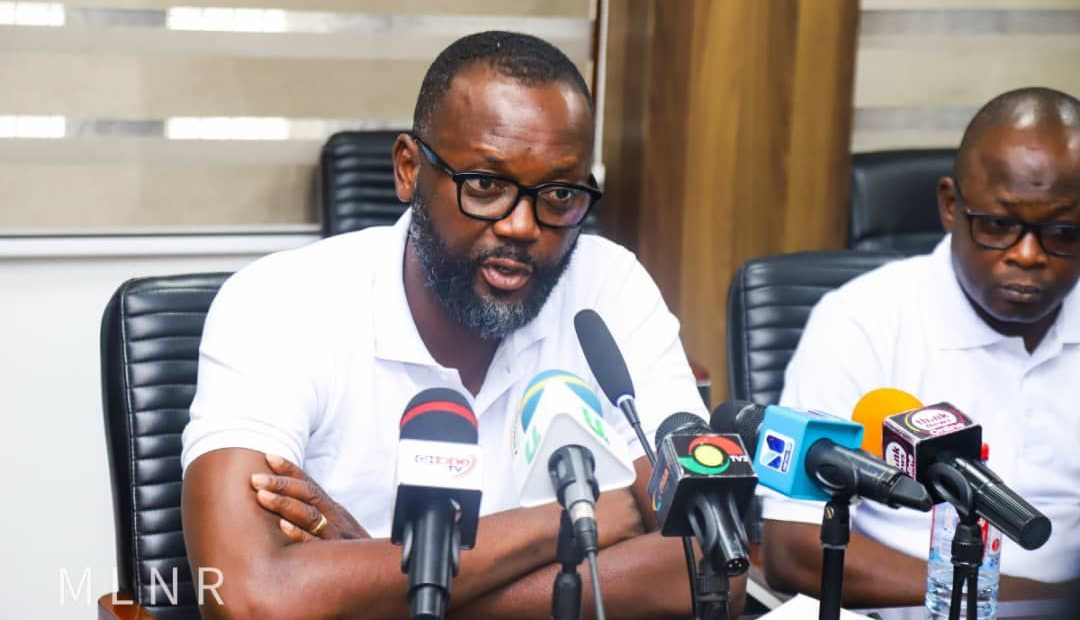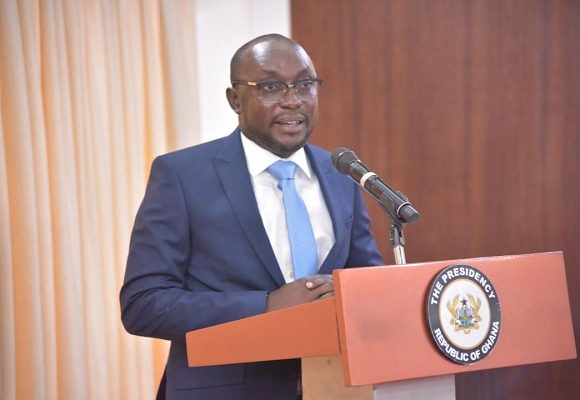Small-Scale Miners Adopt Birim River …Declare Area ‘Red Zone’ Until Turbidity Level Is Reduced

The Ghana National Association of Small-Scale Miners (GNASSM) is waging a fight to restore the Birim River to its former glory by reducing its turbidity level, which is currently in sorry-state at 33NTU.
The group stated that, as an association, they are concerned and committed to the cause, because if there is a ban on small-scale mining, they are first to be affected most.
As a result, they will not disappoint Ghanaians in the task ahead, but will ensure the recalcitrant miners behind the pollution of river bodies are flushed out, without fear of favour.
At a ceremony to officially “hand over” the river to the association in Accra last Thursday, October 13, a deputy minister, George Mireku Duker, said the Ministry of Lands and Natural Resources and Ghanaians generally are expectant that the association will deliver on its new task.
The initiative by the association follows a surge in illegal mining, which has affected several river bodies and forests in several mining communities.
Reports have indicated recently that many river bodies, including the Ankobra, Birim and Offin, which hitherto served as sources of drinking water, have all been polluted as a result of illegal mining, notoriously known as galamsey.
In the case of the Birim River, reports, as recent as at this month, measure the turbidity level as 1900NTU and other times 330NTU.
Turbidity is defined as the measurement of the degree to which the water loses its transparency because of the presence of suspended particles.
Mr. Mireku Duker, who is responsible for mining, said the commendable move by the miners is a supportive role to the ministry’s ongoing fight against illegal mining.
He said the association, at this initial stage, concentrates its efforts solely on the Birim River, and, then, after it succeeds in the piloting, it will extend to other river bodies. The association, he indicated, will be supported by the security agencies to execute this task.
“We thank you for the commitment shown and we believe you will deliver on your mandate. Officially, we have handed the Birim as a river to the Small-Scale Miners Association to ensure that the turbidity level gets better soon.
“The security agencies will collaborate with you and I believe you will sensitize and conscientize your colleagues, not only Birim, but we will pilot it and I am sure with your support Birim will get better.”
Mr. Duker, who is also the Member of Parliament (MP) for the people of Tarkwa-Nsuaem constituency in the Western Region, also outlined some of the measures taken by the ministry.
“We are hoping that with the introduction of the river guards who will be patrolling 24/7 banks of our river bodies, the introduction of the river boats that will be patrolling from the upstream to the downstream, with the introduction of vantage security posts that will be erected to strengthen the work of these river guards of these security agencies the setting up of the situation room at the ministry agency and for that matter Minerals Commission, the introduction of body cams by these river guards to prevent extortions and all other infraction, I believe, the battle will be won, what we need is the support of Ghanaians,” he assured.
He added that, the ministry has recruited river guards who are undergoing training at the Naval Command and will be expected to pass out latest by the end of this month.
He was hopeful that with the coming on board of these river guards, as well as the support of the security agencies, the GNASSM will succeed.
“This morning they are well dressed in their regalia and I believe they are poised to deliver as expected,” he intimated.
He further said the fight against illegal mining, which has become very topical in the recent past, is a shared responsibility, arguing that the attitude of Ghanaians will also have to be changed and ensure everyone play their roles.
“Let us understand that a group of people or an individual can’t or will not be able to fight this canker if we don’t put up some kind of attitudinal change as a country and admit that that, we must brighten the corner where we are.
“So, these small-scale miners are going to brighten the corner where they are by making sure that they collaborate with the ministry to ensure that Birim gets better,” he said.
The General Secretary of the GNASSM, Godwin Armah, said his group has in the past partnered the ministry in many ways and will continue to do same by ensuring that the turbidity level is reduced.
He said they are going to partner the University of Mines and Technology (UMaT) Tarkwa, by subjecting samples of the Birim River to laboratory tests.
“At the last miners’ week, which we collaborated with the University of Mines and Technology in Tarkwa, we pledged that we will take one of the rivers; that is the Birim River and ensure that the turbidity level is reduced, and so yesterday I called the Vice Chancellor and they are prepared to help.
“What we are going to do is to know the turbidity level first by taking samples of the water and send it to the lab, we also want to know the chemicals that are in because a lot of people are talking about chemical pollution of the river bodies without research backing,” he explained.
He added, “We also hear sometimes they talk about the chemicals in cocoa and all that. It is like people keep talking about it, so we need the science aspect of that so that at the end of the day we will be able to handle and put this issue in context, because if you say there is chemical in cocoa, there is chemical in this at the end of the day without any the research, it becomes the fact and then it affects the country internationally.”
As part of the process, Mr. Armah said water will be collected from different communities where the Birim passes, and after evaluation every month, they will inform the ministry and Ghanaians in general.

The association, he disclosed, will be working with the relevant ministries, Minerals Commission, traditional authorities and he district chief executives, among others.
The general secretary said they have already embarked on similar operations in the Atwima-Mponua area in the Ashanti Region, where more than 400 changfans have been moved out of the river there and the turbidity level has been reducing.
But, he said, in this operation, their focus is going to be on the Birim River and they will ensure they achieve their target.
As major industry players, Mr. Armah said they are concerned and committed to the cause and assured they will not disappoint because if there is a ban on small-scale mining, they are going to be affected most.
He challenged members of the association to be vigilant and report anyone that pollutes the rivers to the association or the nearest law enforcement agency, so that “bad nuts” are taken out of the business.
He called on the chiefs not to shield anyone that comes into their community to hire apartments, but ends up causing havoc to the rivers and the environment.
Source: Anchorghana




